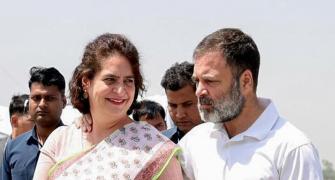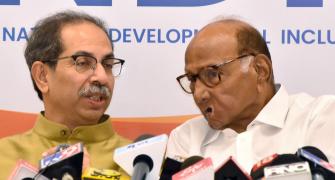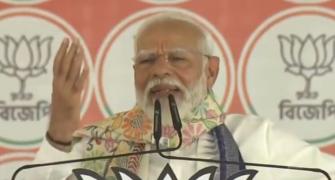This week, I propose to take a break from politics and write about something of concern to us all -- AIDS in India. Perhaps that should read something that should concern us all, because the scary truth is that our politicians and bureaucrats are giving this monster a very low priority on their agenda. But before I explain why I have levelled this charge against them, here are some statistics.
On July 28, 2003, India confirmed that approximately 4.58 million [45.8 lakh] citizens are living with HIV/AIDS according to data available as of December 2002. That does not mean that the full-blown disease has developed in each of them, merely that they have been infected. Since there is no known cure for AIDS that is tantamount to a death sentence in the long run. Worse, this figure represents a huge rise from twelve months earlier when it was 3.97 million [39.7 lakh].
According to the official data, the worst hit areas are the states south of the Vindhyas, particularly Maharashtra and Tamil Nadu. There were 9,106 cases in Maharashtra and 18,276 in Tamil Nadu. (These are actual patients, not just people who might have the virus.) Andhra Pradesh with 2,350 known cases, Gujarat with 2,029, and Karnataka with 1,575 are next in line. In other words, the disease is striking fastest in some of the most economically developed states. (Kerala, which has 'just' 267 known patients is not doing too badly.)
The problem is serious enough that it is attracting attention from foreign agencies as well as home-grown bodies. The Bill & Melinda Gates Foundation, for instance, has announced an initial grant of $100 million to support initiatives against AIDS. But is money enough to slow the spread of AIDS in the face of official apathy?
One of the surest signs of political/bureaucratic lack of interest is to study the money trail. Though India has a National AIDS Control Programme its budget is just a little over Rs 165 crore. (That is more money than most of us will ever see, but just to put everything into perspective it is less than half -- just over one-third -- of what the Gates Foundation has promised.) About Rs 150 crore goes into 'prevention' and only a pittance is left for 'care and support.'
Further, the money is distributed between 38 entities -- 28 states, seven Union territories and three municipal corporations (Mumbai, Chennai, and Ahmedabad).
Of these, Jharkhand does not have a single reported case of AIDS, and has not spent a rupee either on 'care and support' or on 'prevention.' I am happy, but astonished, to learn that a city like Ranchi -- a major transport hub -- is AIDS-free, but does that mean it will remain that way forever? Shouldn't Jharkhand spend some of the Rs 160 lakh it received on 'prevention'?
Jharkhand is not alone. Nine others -- Uttaranchal, Chhattisgarh, Dadra & Nagar Haveli, Daman & Diu, Jammu & Kashmir, Pondicherry, Meghalaya, Madhya Pradesh, and Bihar -- spent absolutely nothing on 'care and support'. (Yes, they do have reported AIDS patients.)
Please do not think that the outlook is any better when it comes to 'prevention.' Maharashtra, for instance, has spent only one-third of its budgetary allocation of Rs 11.30 crore. And Gujarat, believe it or not, utilised less than the Ahmedabad Municipal Corporation both on 'prevention' and on 'care and support'.
For the record, the city fathers of both Chennai and Mumbai have been negligent too; Chennai saw fit to spend a meagre Rs. 14,000 though allotted Rs 60 lakh for 'care and support' while Mumbai spent less than half of its Rs 112 lakh. (Mumbai, I should point out has over five times as many confirmed AIDS cases as Kerala -- 1,563 in all!)
The only places where the threat of AIDS is taken seriously seem to be in the North-East -- Mizoram and Arunachal Pradesh. Both states have used everything that was allotted to them. What is more, they have even dipped into their own funds to spend more than their allocation both on 'prevention' and on 'care and support'. The amounts are not much -- just Rs 10 lakh or so each above the budgeted amounts -- but it is the attitude that counts.
Is there anything we can do to improve the situation? Given the lackadaisical attitude of the various governments involved, there is little point in asking our representatives why they are not spending their allocations. The best we can do is to educate as many people as we can reach because Heaven knows our leaders can't be bothered even about 'prevention'!







